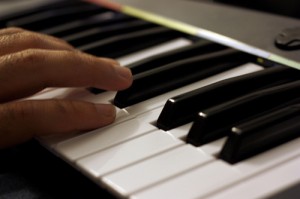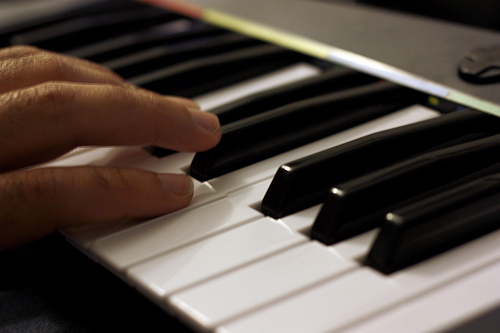 This week I gave a few first lessons to some new students. One of the things I always ask during the first lesson/interview is:
This week I gave a few first lessons to some new students. One of the things I always ask during the first lesson/interview is:
What are some of your goals in taking piano lessons?
Here are some examples of answers I’ve received from students:
- I want to be able to play classical pieces that everyone knows (i.e., Fur Elise, Moonlight Sonata, Bach’s Minuet in G, etc.)
- I want to be able to play hymns and hymn arrangements for church services.
- I want to be able to play from chord charts to play with my church’s worship band.
- I want to record a Christmas CD for my family. (This was a fun project! We worked on Christmas pieces over the whole summer.)
- I like to play by ear but but I want to learn how to read music too.
- I just want to get better at piano just because I enjoy playing for my own enjoyment.
I’m always surprised at the variety of answers I receive when I ask this question. Not all students have specific goals in taking lessons, but it’s always worth asking because you may be surprised at what you learn. Knowing the student’s goals can help the teacher make the piano lessons more relavent to them.
When I was growing up and taking lessons, my mom wanted me to be able to someday play the psalters/hymns that we sung in church. While my teacher at the time agreed to have me work on easy psalters, it soon became clear that this goal was not a priority to her for some reason. The psalter was saved for last in the lesson, and we often ran out of time to work on it together. Soon, the psalter was completely ignored. It was a bit of a disappointment for both my mom and I, I think, when we realized this. Eventually, I had to just learn how to play hymns myself without her help during the lesson. My teacher was very good at hymn-reading (including substituting chords, adding runs, modulating/transposing the last verse, etc.), and even today I wish she would have taught me some of what she knew how to do!
It’s a wonderful thing when the teacher can work together with the student and parent to reach goals. It’s important for the teacher to be aware of those goals and then to tailor the student’s curriculum in order to meet those goals.
Just to be clear, while the student’s goals are wonderful to be working on, it doesn’t of course need to consume the entire student’s curriculum. Just because a new student’s goal is to put together a Christmas CD, for example, doesn’t mean that the only pieces the student will be working on are the Christmas pieces (even if that is what the parent and student might be expecting). If the teacher determines that the student’s reading skills need improvement, for example, playing only familiar tunes isn’t going to be the most efficient route. A solution would be to give the student at least a Lesson and Theory book from a method series. While the student’s goals are extremely valuable, it doesn’t need to consume the entire curriculum.
Photo Credit: aechempati | CC 2.0



I have a group of all beginners, and when I asked about goals, they simply said “I just want to learn to play.” That is a good goal, for sure! But I, as their teacher, am trying to help them shape goals as they learn. When I was younger and taking lessons, I had no goals except to “play.” It’s a good starting point, but I can honestly say that my teachers are the ones who inspired me and helped to shape my goals over the years. Now I know exactly what my goals are for myself, and I try to give my students a glimpse of what COULD BE in their music future. It’s exciting!!
I don’t see many reasons why a students goals shouldn’t be the main focus of the whole curriculum. Even if doing so might leave some skills underdeveloped. As long as a student is still inspired and moving forward, they will eventually reach a point where their goals necessitate developing those underdeveloped skills. But if their goals never require certain skills then studying those things would not have been serving the student.
Personally, I didn’t really understand how to count rhythm in a way that would let me sight read accurately until about ten years into lessons, but I was still able to play many songs fully by using recordings to get the rhythm right and having my teacher check it. My teacher tried to cover it but it was wasted breath until I came to play percussion and needed to learn to count for my goals at which point it was very easy to learn.
Hi Joy!
I am “Joy” also! There aren’t very many people with that name! I always thought it would be nice to have a goal worksheet. Something the student and teacher could work through together (parents, too, if so desired). It would be a great reference for the teacher as he or she plans the lessons throughout the semester or year. I’ve never taken the time to create one, though. Do you know of anything like that already?
Joy